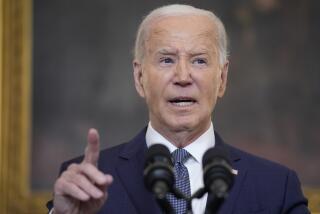Reagan Sees ‘Receptive Climate’ for Arms Pact
WASHINGTON — President Reagan declared Tuesday that “the climate is now receptive to an historic proposal” for the United States and the Soviet Union to eliminate all medium-range nuclear weapons, and Administration officials again raised the possibility of a superpower summit by the end of the year.
As the United States formally proposed new concessions on arms control at talks in Geneva, Reagan said Soviet leader Mikhail S. Gorbachev’s renunciation of the placement of some missiles in Asia removed “a major stumbling block.”
On the same day that Reagan made his first public comments on the Soviet leader’s remarks last week, White House spokesman Marlin Fitzwater said, “It provides us with a very optimistic foundation for continued talks and for an agreement.”
Fitzwater also confirmed that Secretary of State George P. Shultz and Soviet Foreign Minister Eduard A. Shevardnadze will meet in September in a session that had once been tentatively scheduled for this month.
They are likely to meet in the middle of September when Shevardnadze visits the United States to attend the opening of the U.N. General Assembly in New York. Shevardnadze would be likely to confer with Shultz in Washington, raising the possibility that he might also meet with Reagan.
A White House official, speaking on condition of anonymity, said U.S. and Soviet officials have “no serious dates in mind” for a Reagan-Gorbachev meeting that might follow the Shevardnadze visit.
“We just got things back on track in Geneva,” he said.
Although indications of progress have emerged over the last week at the White House and the Kremlin, at least one major obstacle remains: the Soviet insistence that U.S. warheads for West Germany’s 72 aging Pershing 1-A missiles be destroyed.
The United States has refused to take that step, and there has been no sign that either side will relent on this issue. But the White House official said, “People don’t think the Soviets are going to fall on their sword over it.”
The flurry of arms-control activity occurs after an anxious period of several weeks in late spring and early summer in which U.S. officials awaited a Soviet response to U.S. proposals and feared that the Kremlin was testing Reagan’s political strength because of the Iran- contra scandal.
Until last week, there had been little movement since April, when Shultz journeyed to Moscow and was told by Gorbachev that the Soviets were ready to eliminate shorter-range missiles in Europe within a relatively short and clearly defined period.
Hopes Had Been Fading
In the interim, White House officials expressed concern that the prospects for a summit conference appeared to be fading, along with their hopes not only for a speedy achievement of an arms control agreement but also for the political boost that it would generate for Reagan.
Last Wednesday, however, Gorbachev embraced the central elements in Reagan’s proposal to eliminate all intermediate-range missiles, both those with a 600- to 3,000-mile range and those with a 300- to 600-mile range. He dropped the Kremlin’s previous insistence on retaining 100 warheads of the 600-to-3,000-mile category in Asia and allowing the United States to keep a like number on its own soil.
U.S. officials had argued that because an agreement based on this so-called “global double-zero” option would eliminate all the medium- and shorter-range weapons, it would be easier to verify than a treaty that allowed the retention of some missiles.
The United States on Tuesday formally submitted to the Geneva arms negotiations its new proposal to eliminate both groups of missiles.
Reagan, at the start of an address to scientists and business executives attending a conference on superconductivity, said, “We are pleased the Soviets have now expressed support for both concepts.”
The President said his proposal includes “two vital new elements: . . . the destruction of missiles and launchers covered by the treaty and no conversion of these systems and launchers to other types of weapons.” These elements had been expected to be a part of the U.S. proposal.
Missile Transfers Barred
He said the proposal makes provisions “for strict and effective verification” of adherence to the treaty and rejects “transfer of existing U.S. and Soviet (intermediate-range) missiles and launchers to any third party.”
“There is still much to do in Geneva, but I’m heartened that the climate is now receptive to an historic proposal of this type,” Reagan said.
Although Reagan made no reference to the warheads on the existing German missiles, his remarks signaled formal acceptence of other key elements in an informal proposal advanced by a Soviet arms-control expert last month that hinged on two conditions:
--A U.S. guarantee not to convert ground-launched cruise missiles to sea-launched cruise missiles; nor to convert Pershing 2 ballistic missiles, with a range of 1,250 miles, to Pershing 1-B missiles with a range of about 550 miles.
--A U.S. promise not to modernize the German-owned Pershing 1-A missiles by converting them into Pershing 1-Bs.
More to Read
Get the L.A. Times Politics newsletter
Deeply reported insights into legislation, politics and policy from Sacramento, Washington and beyond. In your inbox three times per week.
You may occasionally receive promotional content from the Los Angeles Times.










